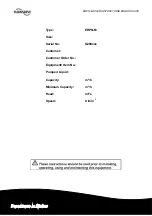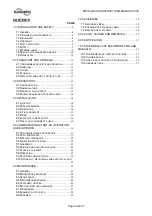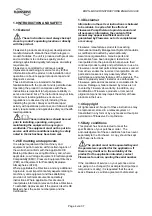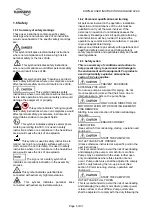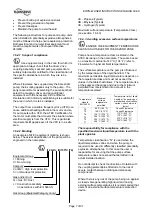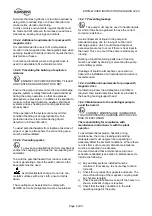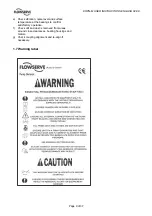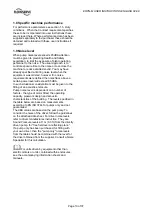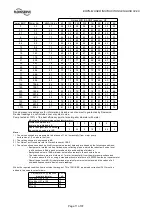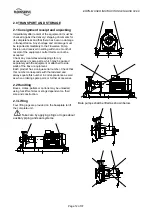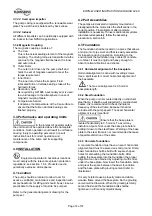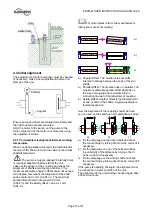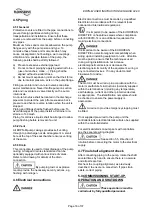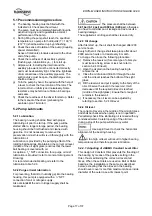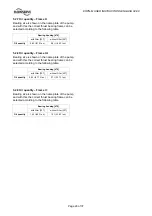
ERPN-M USER INSTRUCTIONS ENGLISH 02-08
Page 5 of 37
1.6 Safety
1.6.1 Summary of safety markings
These user instructions contain specific safety
markings where non-observance of an instruction
would cause hazards. The specific safety markings
are:
This symbol indicates electrical safety instructions
where non-compliance will involve a high risk to
personal safety or the loss of life.
This symbol indicates safety instructions
where non-compliance would affect personal safety
and could result in loss of life.
This symbol indicates "hazardous and toxic
fluid" safety instructions where non-compliance would
affect personal safety and could result in loss of life.
This symbol indicates safety
instructions where non-compliance will involve some
risk to safe operation and personal safety and would
damage the equipment or property.
This symbol indicates "strong magnetic
field" safety instructions where non-compliance would
affect personal safety, pacemakers, instruments or
stored data sensitive to magnetic fields.
This symbol indicates explosive atmosphere
marking according to ATEX. It is used in safety
instructions where non-compliance in the hazardous
area would cause the risk of an explosion.
This symbol is used in safety instructions to
remind not to rub non-metallic surfaces with a dry
cloth; ensure the cloth is damp. It is used in safety
instructions where non-compliance in the hazardous
area would cause the risk of an explosion.
The sign is not a safety symbol but
indicates an important instruction in the assembly
process.
This symbol indicates potential risks
connected with extremely high temperatures.
This symbol indicates potential risks
connected with extremely low temperatures.
1.6.2 Personnel qualification and training
All personnel involved in the operation, installation,
inspection and maintenance of the unit must be
qualified to carry out the work involved. If the
personnel in question do not already possess the
necessary knowledge and skill, appropriate training
and instruction must be provided. If required the
operator may commission the manufacturer / supplier
to provide applicable training.
Always co-ordinate repair activity with operations and
health and safety personnel, and follow all plant
safety requirements and applicable safety and health
laws/regulations.
1.6.3 Safety action
This is a summary of conditions and actions to
help prevent injury to personnel and damage to
the environment and to equipment. For products
used in potentially explosive atmospheres
section 1.6.4 also applies.
PREVENT EXCESSIVE
EXTERNAL PIPE LOAD
Do not use pump as a support for piping. Do not
mount expansion joints so that their force, due to
internal pressure, acts on the pump flange.
ONLY CHECK DIRECTION OF
MOTOR ROTATION WITH COUPLING ELEMENT/
PINS REMOVED
Starting in reverse direction of rotation will damage
the pump.
ENSURE CORRECT
LUBRICATION
(See section 5
Commissioning, startup, operation and
shutdown
.)
START THE PUMP WITH
OUTLET VALVE PART OPENED
(Unless otherwise instructed at a specific point in the
user instructions.)
This is recommended to avoid the risk of overloading
and damaging the pump motor at full or zero flow.
Pumps may be started with the valve further open
only on installations where this situation cannot
occur. Pump outlet valve shall be adjusted to comply
with the duty following the run-up process (See
section 5
Commissioning, startup, operation and
shutdown
).
START THE PUMP WITH
OUTLET VALVE FULLY OPEN
This is recommended to avoid the risk of overloading
and damaging the pump motor where greater power
is taken at low or shut off flow. Pump outlet valve
shall be adjusted to comply with the duty following the


